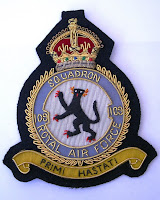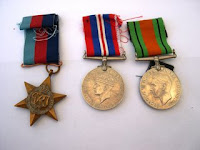Scroll down to the post after next (or click here) and you will see a group photo of some of the remaining RAF Pathfinders. Sadly I was unable to accompany dad and mum to this year’s event. My sister and her husband went in my place and an excellent time was had by all. The Pathfinders were an international force. The commander, Don Bennett, was Australian. There were representatives from many former dominions (including not a few from neutral Eire, including my father of course) and colonies, not to mention the odd American and other nationalities (although the only German RAF pilot, Hugo Adam, flew fighters).
At the back you will see an elderly West Indian. This is Ulric Cross, one of over 250 Trinidadians who served in the RAF during WWII of whom 52 were killed in action. Ulric Cross flew 80 ops as a navigator and rose to the rank of Squadron Leader. He was awarded the Distinguished Flying Cross and the Distinguished Service Order. He subsequently became a high court judge in Trinidad and the nation’s High Commissioner to the United Kingdom.
This year’s Pathfinder Sunday event was the first time my father and Ulric Cross got the chance to meet. They were in different squadrons - Ulric in 139sqn, my father in 109sqn and then on detachment to squadrons in North Africa, Italy and finally Burma. For both of them issues of colour, creed, nationality or class are irrelevant. What counts to them was that they were comrades in arms. Both knew what it was like to fly on air raids, to fly in their beloved Mosquitos, to use the bubble sextant and other tools of the navigator’s trade and of course to be part of an elite force.
According to a news item from the Trinidad Express reprinted on his website, Ken Follett was inspired by Ulric Cross’s wartime experiences to include a black Squadron Leader called Charles Ford in the prologue of his book Hornet Flight. This was not universally well received: one Alan Frampton, who claimed to have been an RAF pilot in the RAF between 1942 and 1946, wrote an angry letter to Follet from Zimbabwe. Frampton described the inclusion of the Ford character as a "sop" to black people who may read Hornet Flight.
In his letter Frampton said he became infuriated after reading a few pages of Hornet Flight and came upon the character Ford, the Black Squadron Leader, who at the time had 15-plus missions to his credit. He said he threw down the book in disgust. "For the life of me, I cannot recall ever encountering a black airman of any rank whatsoever during the whole of my service.... In my book, Charles (Ford) is not a credible character and I suspect he was introduced as a 'sop' to black people who may read your book. He certainly aroused my indignation, remembering as I do, the real heroes of that period in our history, who were not black.... I regard myself as a realist but certainly not an apologist for my race. I have read several of your books and enjoyed them. This one I threw down in disgust."
Follet's reply to Frampton concluded by saying: "With true-life heroes as he (Cross), there's no need for a 'sop' to black people, really, is there?" Cross received copies of both letters from his daughter. Although was not annoyed or shocked over the claims from a fellow member of the RAF, he said he just could not understand how Frampton did not know about him and the other black members of the RAF. "He must be living in a strange world," he said "I am old enough to have a certain amount of tolerance. People believe what they need to believe. For some reason Frampton needs to believe that. When you know what you have done, what people think is irrelevant”
Cross’s dignified response contrasts strongly with my father’s opinion of Frampton: “Well he’s a fucking liar... wanker” were his exact words but then again my father was an electrician and not a diplomat!
Make of this story what you will. Me? I consider Cross to be a brave man who served this country during its gravest hour and he was by no means alone. My father, for example, was one of 60,000+ citizens of neutral Eire who did likewise.
I am sure that there are some who would think that highlighting this tale is an exercise in political correctness on my part. The second word of my response to them is “off”.
Click here to see a photograph of Cross during WWII
















